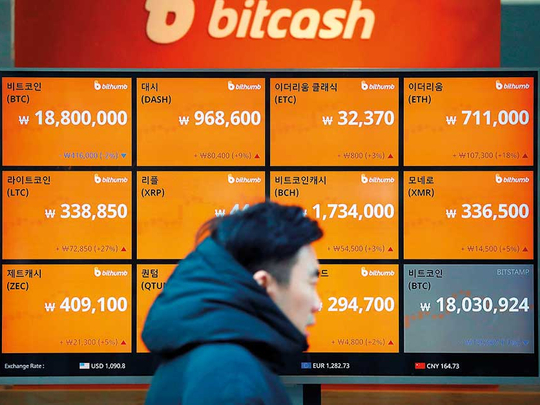
Hong Kong, Seoul, Washington: The 2018 sell-off in cryptocurrencies deepened, wiping out $42 billion (Dh154 billion) of market value over the weekend and extending this year’s slump in Bitcoin to more than 50 per cent.
Some observers pinned the latest retreat on an exchange hack in South Korea, while others pointed to lingering concern over a clampdown on trading platforms in China. Cryptocurrency venues have come under growing scrutiny around the world in recent months amid a range of issues including thefts, market manipulation and money laundering.
Bitcoin has dropped about 12 per cent since 5pm New York time on Friday and was trading at $6,764.34 as of 11:45am in London on Monday, bringing its decline since Dec. 29 to 53 per cent. Most other major virtual currencies also retreated since Friday, sending the market value of digital assets tracked by Coinmarketcap.com to a nearly two-month low of $298 billion. At the height of the global crypto-mania in early January, they were worth about $830 billion.
Enthusiasm for virtual currencies has waned partly due to a string of cyber heists, including the nearly $500 million theft from Japanese exchange Coincheck Inc. in late January. While the latest hacking target — a South Korean venue called Coinrail — is much smaller, the news triggered knee-jerk selling, according to Stephen Innes, head of Asia Pacific trading at Oanda Corp. in Singapore.
“This is ‘If it can happen to A, it can happen to B and it can happen to C,’ then people panic because someone is selling,” Innes said.
The slump may have been exacerbated by low market liquidity during the weekend, Innes added.
“The markets are so thinly traded, primarily by retail accounts, that these guys can get really scared out of positions,” he said. “It actually doesn’t take a lot of money to move the market significantly.”
Coinrail said in a statement on its website that some of the exchange’s digital currency appears to have been stolen by hackers, but it didn’t disclose how much. The venue added that 70 per cent of the cryptocurrencies it holds are being kept safely in a cold wallet, which isn’t connected to the internet and is less vulnerable to theft. Two-thirds of the stolen assets — which the exchange identified as NPXS, NPER and ATX coins — have been frozen or collected, while the remaining one third is being examined by investigators, other exchanges and cryptocurrency development companies, it said.
Coinrail trades more than 50 cryptocurrencies and was among the world’s Top 100 most active venues, with a 24-hour volume of about $2.65 million, according to data compiled by Coinmarketcap.com before news of the hack.
The Korean National Police Agency is investigating the case, an official said by phone.
In China, the Communist Party-run People’s Daily reported on Friday that the country will continue to crack down on illegal fund-raising and risks linked to internet finance, quoting central bank officials. The nation’s cleanup of initial coin offerings and Bitcoin exchanges has almost been completed, the newspaper said, citing Sun Hui, an official at the Shanghai branch of the central bank.
Some Asia-listed stocks with exposure to digital currencies fell on Monday. South Korea’s Omnitel Inc. and Vidente Co. retreated at least 3.9 per cent, while Japan’s Remixpoint Inc. slumped 4.9 per cent.
— Bloomberg











